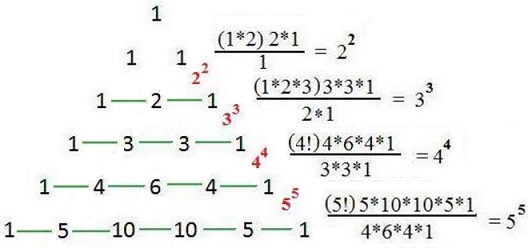Ascending Bases and Exponents in Pascal's Triangle
Tony Foster 4 May, 2016
For integer $n\gt 1,\;$ let $\displaystyle P(n)=\prod_{k=0}^{n}{n\choose k}\;$ be the product of all the binomial coefficients in the $n\text{-th}\;$ row of the Pascal's triangle. Then
$\displaystyle\frac{\displaystyle (n+1)!P(n+1)}{P(n)}=(n+1)^{n+1}.$
To illustrate:

Proof
$P(n)\;$ is given by
$\displaystyle P(n) = \prod_{k=0}^{n}{n\choose k}=\prod_{k=0}^n\frac{n!}{k!(n-k)!}=(n!)^{n+1}\prod_{k=0}^n\frac{1}{k!}\prod_{k=0}^n\frac{1}{(n-k)!}=(n!)^{n+1}\prod_{k=0}^n\frac{1}{(k!)^2}.$
Therefore,
$\displaystyle\begin{align} \frac{(n+1)!P(n+1)}{P(n)} &= \frac{\left[(n+1)!\right]^{n+3}\displaystyle\prod_{k=0}^{n}(k!)^2}{\left[n!\right]^{n+1}\displaystyle\prod_{k=0}^{n+1}(k!)^2}\\ &=\frac{\left[(n+1)!\right]^{n+3}}{\left[n!\right]^{n+1}\left[(n+1)!\right]^2}\\ &=\frac{\left[(n+1)!\right]^{n+1}}{\left[n!\right]^{n+1}}\\ &=(n+1)^{n+1}. \end{align}$
In other words, $\displaystyle\frac{P(n+1)}{P(n)}=\frac{(n+1)^{n+1}}{(n+1)!}=\frac{(n+1)^n}{n!}.$
(Note: some while later Tony cameup with a more general property of Pascal's triangle.)
Pascal's Triangle and the Binomial Coefficients
- Binomial Theorem
- Arithmetic in Disguise
- Construction of Pascal's Triangle
- Dot Patterns, Pascal Triangle and Lucas Theorem
- Integer Iterations on a Circle
- Leibniz and Pascal Triangles
- Lucas' Theorem
- Lucas' Theorem II
- Patterns in Pascal's Triangle
- Random Walks
- Sierpinski Gasket and Tower of Hanoi
- Treatise on Arithmetical Triangle
- Ways To Count
- Another Binomial Identity with Proofs
- Vandermonde's Convolution Formula
- Counting Fat Sets
- e in the Pascal Triangle
- Catalan Numbers in Pascal's Triangle
- Sums of Binomial Reciprocals in Pascal's Triangle
- Squares in Pascal's Triangle
- Cubes in Pascal's Triangle
- Pi in Pascal's Triangle
- Pi in Pascal's Triangle via Triangular Numbers
- Ascending Bases and Exponents in Pascal's Triangle
- Determinants in Pascal's Triangle
- Tony Foster's Integer Powers in Pascal's Triangle
|Contact| |Front page| |Contents| |Algebra|
Copyright © 1996-2018 Alexander Bogomolny
73729720
